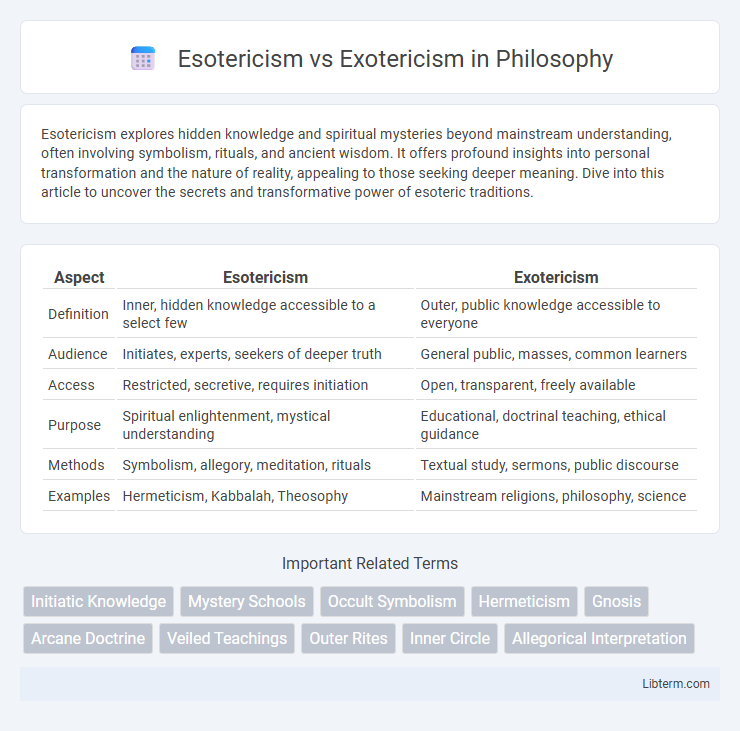Esotericism explores hidden knowledge and spiritual mysteries beyond mainstream understanding, often involving symbolism, rituals, and ancient wisdom. It offers profound insights into personal transformation and the nature of reality, appealing to those seeking deeper meaning. Dive into this article to uncover the secrets and transformative power of esoteric traditions.
Table of Comparison
| Aspect | Esotericism | Exotericism |
|---|---|---|
| Definition | Inner, hidden knowledge accessible to a select few | Outer, public knowledge accessible to everyone |
| Audience | Initiates, experts, seekers of deeper truth | General public, masses, common learners |
| Access | Restricted, secretive, requires initiation | Open, transparent, freely available |
| Purpose | Spiritual enlightenment, mystical understanding | Educational, doctrinal teaching, ethical guidance |
| Methods | Symbolism, allegory, meditation, rituals | Textual study, sermons, public discourse |
| Examples | Hermeticism, Kabbalah, Theosophy | Mainstream religions, philosophy, science |
Defining Esotericism and Exotericism
Esotericism refers to knowledge or practices intended for a select, often initiatory, group, emphasizing hidden meanings and inner spiritual truths accessible only to the enlightened. Exotericism denotes knowledge and teachings openly available and designed for the general public, focusing on external rituals, moral codes, and widely accepted doctrines. Both concepts contrast the accessibility and depth of spiritual or philosophical teachings, defining the boundary between secret wisdom and public doctrine.
Historical Origins and Evolution
Esotericism traces its origins to ancient mystery schools and secretive philosophical traditions that emphasized hidden knowledge accessible only to initiates, evolving through Hermeticism, Gnosticism, and Kabbalah. Exotericism developed alongside as the public dissemination of religious and philosophical teachings designed for the general populace, exemplified by mainstream doctrines in early Christianity and classical philosophy. The historical evolution of both concepts reflects a dynamic interplay where esoteric knowledge remained concealed within inner circles, while exoteric teachings ensured wider cultural and social transmission.
Core Principles of Esotericism
Esotericism centers on hidden knowledge accessible only to a select group, emphasizing inner transformation, spiritual enlightenment, and metaphysical truths beyond ordinary perception. Core principles include initiation, symbolism, secrecy, and the belief in a transcendent reality that connects all existence. This contrasts sharply with exotericism, which promotes open, external teachings aimed at the general public and conventional religious practices.
Fundamental Aspects of Exotericism
Exotericism emphasizes accessible religious and philosophical teachings intended for the general public, focusing on communal rituals, moral codes, and widely accepted doctrines. It prioritizes clarity, external practices, and shared traditions that maintain social cohesion and spiritual guidance without requiring hidden knowledge. The fundamental aspects of exotericism include public scripture, institutional authority, and ethical norms designed to be universally understood and practiced.
Symbolism and Interpretation
Esotericism centers on hidden or symbolic meanings behind rituals, texts, and symbols, requiring initiates to engage in deep, often mystical interpretation beyond surface understanding. Exotericism emphasizes outward, accessible teachings and symbols meant for general public comprehension, promoting a literal or straightforward interpretation. Symbolism in esotericism serves as a coded language for spiritual truths, while in exotericism, symbols function as practical representations aimed at moral or educational instruction.
Accessibility of Knowledge
Esotericism emphasizes the accessibility of knowledge through hidden, symbolic, or secret teachings reserved for a select group of initiates, often requiring extensive study and inner transformation to comprehend. In contrast, exotericism prioritizes openly shared, straightforward teachings designed for the general public, promoting widespread understanding without specialized prerequisites. This distinction highlights how esoteric knowledge is guarded and cloaked in allegory, while exoteric knowledge is transparent and accessible to all.
Role in Religious Traditions
Esotericism plays a crucial role in religious traditions by offering hidden, mystical knowledge accessible only to initiated members, emphasizing inner spiritual experiences and secret teachings. Exotericism, in contrast, provides the outward, public expression of religion through rituals, doctrines, and moral codes designed for the broader community. Together, esoteric and exoteric elements maintain religious continuity, balancing personal spiritual enlightenment with communal religious identity.
Social and Cultural Impact
Esotericism often shapes subcultural identities and underground movements by promoting exclusive knowledge and spiritual practices, fostering community bonds among initiates. Exotericism, by contrast, influences mainstream culture through widely accessible beliefs and rituals, impacting public institutions and social norms. The interplay between esoteric secrecy and exoteric openness drives cultural diversity and social dynamics, shaping how societies negotiate knowledge, power, and spirituality.
Esoteric vs Exoteric Practices
Esoteric practices involve secretive, inner teachings reserved for a select group, emphasizing personal spiritual transformation and mystical knowledge beyond ordinary perception. Exoteric practices are openly accessible rituals and doctrines designed for public participation, often serving social, ethical, or religious functions within a community. The distinction highlights a divide between hidden wisdom accessible only through initiation and publicly taught beliefs intended for a broad audience.
Contemporary Relevance and Debates
Esotericism and exotericism remain central to contemporary debates on knowledge accessibility, emphasizing the tension between hidden, specialized wisdom and publicly available information. Modern spiritual movements often blur these boundaries, challenging traditional exoteric institutions and fostering renewed interest in esoteric practices like mystical experiences and symbolic interpretation. This dynamic fuels ongoing discussions about authenticity, authority, and the democratization of sacred knowledge in the digital age.
Esotericism Infographic

 libterm.com
libterm.com